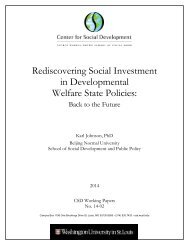Exploring and Assessing Intercultural Competence - Center for ...
Exploring and Assessing Intercultural Competence - Center for ...
Exploring and Assessing Intercultural Competence - Center for ...
Create successful ePaper yourself
Turn your PDF publications into a flip-book with our unique Google optimized e-Paper software.
C. Other<br />
<strong>Exploring</strong> <strong>and</strong> <strong>Assessing</strong> <strong>Intercultural</strong> <strong>Competence</strong><br />
The fact that the study was conducted in languages other than English constituted both a<br />
strength <strong>and</strong> weakness. It was a strength because most other studies have been conducted in<br />
English; we need to learn more about what transpires in other languages. The major study cited<br />
earlier of the Canadian Development Agency regarding the per<strong>for</strong>mance of technical advisors<br />
(both English- <strong>and</strong> French-speakers) in various countries where still other languages were in use,<br />
is weakened by the fact that interviews <strong>and</strong> questionnaires were all completed only in English<br />
(<strong>and</strong>, as a sociolinguist, I am keenly aware of the impact that the language medium has on the<br />
results obtained). Clearly, we need studies conducted elsewhere, by others, <strong>and</strong> in their own<br />
languages, but this also comes at a cost. We recognized this <strong>and</strong> attempted to minimize the<br />
downside even while experiencing disappointment with the per<strong>for</strong>mance of one of our MOs.<br />
8. Data Compilation <strong>and</strong> Organization<br />
Be<strong>for</strong>e compiling any data, completed <strong>for</strong>ms were coded to protect the identity of respondents: a<br />
B or S indicated country of origin, followed by A <strong>for</strong> alumni, V <strong>for</strong> volunteer, MV <strong>for</strong> Mentor<br />
evaluations of volunteers, <strong>and</strong> MS <strong>for</strong> Mentor self-evaluations, followed by a separate number <strong>for</strong><br />
each <strong>for</strong>m. Hence, the 8 British respondents ranged from BA1 through BA8 <strong>and</strong> Swiss alumni<br />
were coded with an S + A + number so that the 20 respondents ranged from SA1 through SA20.<br />
In contrast, British Volunteers <strong>and</strong> Swiss Volunteers were coded as BV or SV, Mentors<br />
evaluating volunteers as MV, <strong>and</strong> Mentors evaluating themselves as MS. Since volunteers <strong>and</strong><br />
mentors completed <strong>for</strong>ms twice (at beginning <strong>and</strong> end of service), their final evaluations had the<br />
additional letters (FE) as a prefix; <strong>for</strong> example: (FEBV 8) or (FEMS5).<br />
To begin the compilation process, a blank survey <strong>for</strong>m was first reproduced on a web-based<br />
survey developed through Perseus Express, .<br />
Data from completed <strong>for</strong>ms were then entered into the master Perseus <strong>for</strong>m in each category. The<br />
result was an electronic composite ready <strong>for</strong> transfer into a second program designed to facilitate<br />
statistical analyses – the SPPS or Statistical Package <strong>for</strong> Social Sciences. At this point, data were<br />
now ready <strong>for</strong> quantitative analysis, discussed in the next section.<br />
Qualitative data, on the other h<strong>and</strong>, required some additional preliminary steps given that<br />
in<strong>for</strong>mation was given by respondents in their native tongues: For this reason, data were initially<br />
compiled by local RAs who then translated <strong>and</strong> <strong>for</strong>warded data summaries in English to Vermont.<br />
The translated data were treated first as sub-sets by country <strong>and</strong> category of participants (alumni,<br />
volunteers, mentors) <strong>and</strong> subsequently compiled <strong>and</strong> analyzed where needed as composite<br />
international samples that eventually provided the responses to our research questions.<br />
Presentation <strong>and</strong> discussion of qualitative data follows the quantitative section <strong>and</strong> is found in<br />
section 10 below.<br />
<strong>Center</strong> <strong>for</strong> Social Development<br />
Washington University in St. Louis<br />
16
















